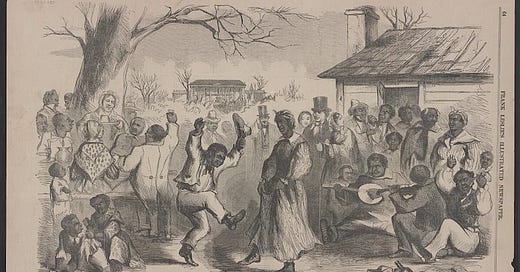A newspaper story we’ve just read might have solved a little Flood mystery.
A few years ago, we chose the old folk song called “Raisin’ a Ruckus” as a kind of theme song for our assorted events, from concerts and parties to our house band duties at the wonderful old monthly Route 60 Saturday Night variety shows. At one of those events, someone in the audience told us that she thought the song was somehow related to Christmastime. Frankly, that mystified us — nothing in the tune seemed to us the least jingle-bell-ish — and our new friend didn’t know or at least couldn’t remember the tune’s link to the holidays.
Oh? You say you’re not familiar with the song? Here’s a video from a 2019 show we did at The Woodlands that opens with it. See if you hear anything Yuletidy in it.
Yeah, we don’t hear it either.
Anyway, now enters today’s Washington Post and Gillian Brockell’s story about a Jonkonnu (pronounced “John Canoe”), a folk custom practiced by enslaved Africans and their descendants.
Before the Civil War, the custom already was quite well established along coastal North America, especially in North Carolina (a region that also might been the original home of our folk song). As Brockell points out, the thing about Jonkonnu was that it was holiday on which slaves were permitted to mock their enslavers. Revelers paraded on plantations and in towns and cities, sometimes on Christmas day, but more commonly on Dec. 26, picking up a bigger crowd as they marched.
“That included going to the homes of their White enslavers, White clergy and other townspeople,” Brockell writes in The Post, “where they would ‘raise a ruckus’ until they were given money or gifts to leave. The revelers played instruments — drums, violins, banjos, tambourines and the like — and dressed in costumes that White observers sometimes described as ‘grotesque.’ Intimidation and mocking of White people was one element of the parade …. One of the costumed revelers would carry a whip and threaten children with it; another would dress in a suit and tri-cornered or top hat and act out unflattering depictions of their enslavers.”
Well, now, we can’t guarantee that this really is the Christmas connection for “Raisin’ a Ruckus,” but it’s the best evidence we have so far. You can check out the article yourself and see what you think.
Meanwhile, Happy Jonkonnu, friends. If you’ve got a ruckus that needs raisin’, tonight’s your night!





so interesting!
I remember that Debbie Reynolds sang this same song in the 1962 movie: "How the West Was Won." She is trying to lift the spirits of the other travelers in a wagon train led by Robert Preston who falls for her. BTW - The title of the song seems to indicate that it was a slave song. Slave songs of the Gullah Geechee people and others often referred to slave boatmen who were responsible for transporting slaves and their owners, visitors from one plantation to another in coastal areas.